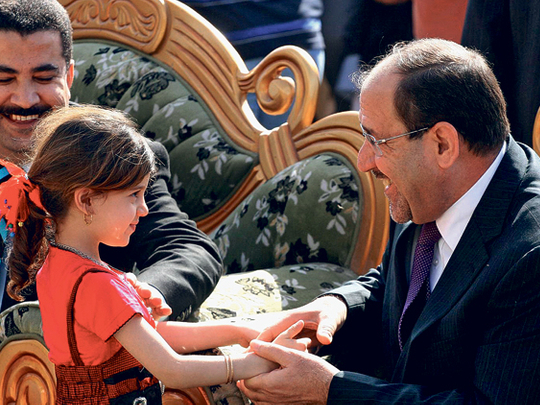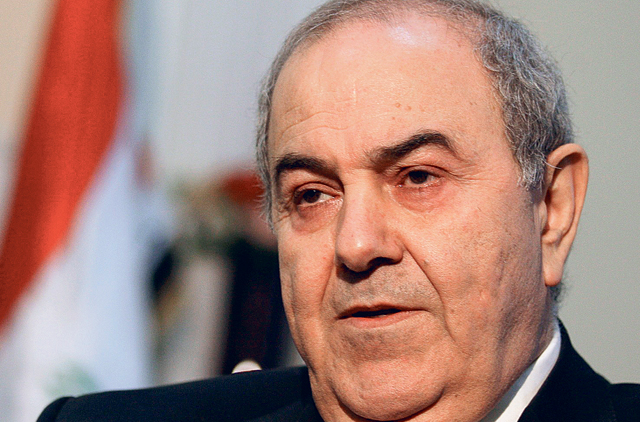
Ahead of the March 7 elections in Iraq, the results of a government-mandated poll were released recently, tailor-made to fit the size and ambitions of Prime Minister Nouri Al Maliki.
The National Media Centre, which reports to the Prime Minister's Office, noted that Al Maliki's State of Law Alliance (SoL) will be getting the lion's share of seats — an expected 29.2 per cent of the 325-seat parliament, meaning no less than 30 per cent of seats in Baghdad. Most observers of the Iraqi scene, however, have been predicting a defeat for the SoL — perhaps not for Al Maliki himself, who will manage to maintain his seat in the upcoming parliament but not his job at the premiership.
Since coming to power in 2006, Al Maliki has promoted himself as the man who will bring stability and security to Iraq, originally earning the support of both Sunnis and Shiites.
Due to civil war on the streets of Baghdad and his refusal to empower the Sunnis through government posts, greater authority and general amnesty, the Sunnis walked out on Al Maliki in the summer of 2007 and have since stood on opposite sides of the political spectrum, accusing him of being sectarian and an agent of the Iranians. Many of his traditional Shiite allies, such as Moqtada Al Sadr, also abandoned the prime minister, accusing him of being too close to the United States.
Arab states that had originally supported Al Maliki, such as Syria and Saudi Arabia, also turned their back on him — for different reasons. Damascus was infuriated when he blamed the August 2009 attacks on Iraqis living in Syria, instead of taking blame for lax security at his Ministry of Interior.
Saudi Arabia accused him of pursing an agenda that aimed at spreading Khomeinism in Iraq, thereby systematically persecuting Sunnis and transforming Iraq into a hotbed for Iranian activity. For its part, Iran too was not very pleased with Al Maliki or the failed state that emerged under his leadership since 2006, giving Iran a bad name in the streets of Iraq.
Making things worse for the Iranians was the inflated ego of the Iraqi prime minister, who created the State of Law Coalition to run for provincial elections in January 2009, distancing himself from Iranian support. He did not let some of Iran's trusted allies join the SoL and watched in silence as former allies such as the Supreme Iraqi Islamic Council (SIIC) were defeated in 8 out of 11 provinces throughout Iraq.
He did it again with the upcoming parliamentary elections, refusing to join the Iran-backed Iraq National Alliance (INA) that included former friends such as Ammar Al Hakim of SIIC and Moqtada Al Sadr. Three terror attacks in August, October and December 2009 shattered whatever credibility the prime minister had among Iraqis from all sects, given that the targets of these attacks were a mixture of Sunnis and Shiites.
By late 2009, Al Maliki felt vulnerable once again, in desperate need of Iranian protection, and requested to merge his SoL with the INA — something of course, which was turned down by rival political groups within Iraq and by the Iranians.
Given the prime minister's background, the findings of the National Media Centre need to be taken with a pinch of salt and plenty of serious doubt.
Reportedly, second runner-up with a parliamentary majority would be the Iraqi National List of former prime minister Iyad Allawi, which will take 21.8 per cent of parliament. That too is difficult to believe, given Allawi's secular and non-military background — a setback no doubt in a society swarming with religiously driven politicians and voters, all armed with guns to the teeth, seeking a leader who can protect them in similar fashion.
Religiously driven Shiites and the Sunnis who did vote succeeded in getting him no more than 9 per cent of the 2005 parliament. Back then Sunnis frowned upon Allawi welcoming the 2003 invasion of Iraq while Iran-backed Shiites accused him of being dangerously close to the US.
True, Allawi has managed to shake off that image by visiting Saudi Arabia recently and reaching out to all sects and banking on the tarnished reputation of the incumbent Al Maliki — telling Iraqis that he would make a perfect alternative to the present prime minister.
Another thorny issue in the Media Centre survey is that Hakim's SIIC, part of the INA, is predicted to get no more than 17.2 per cent of the votes, although back in 2005 this coalition had an absolute majority in parliament.
The death of its founder Abdul Aziz Hakeem in 2009, the lack of appeal of his successor Ammar, and their strong Iranian connection are adequate reasons for the decrease in SIIC's popularity. But that doesn't mean such a dramatic drop, given that they have the Shiite business elite behind them in addition to young and poor people supportive of Al Sadr. Although Hakeem many not be very popular, Al Sadr remains king in the slums and ghettos of Baghdad, having commanded no less than 17 per cent of seats in the 2009 provincial elections.
The survey also says that the Kurdistan Alliance, which has the two largest Kurdish parties in parliament, will take no more than 10 per cent of the vote, although back in 2005 they had an impressive 21 per cent (a total of 53 seats).
The last piece of information revealed in the survey — which looks as if it has Al Maliki's fingerprints all over it — is that the Iraqi Accordance Front (the largest Sunni party) will get no more than 2.7 per cent of parliament. The Iraqi Accordance Front is Al Maliki's worst nightmare, having challenged him non-stop since 2006. It joined the Al Maliki Cabinet and walked away from it, accusing him of being an Iranian agent. Among other things, it wants amnesty for thousands of Iraqi Sunnis, especially those arrested without warrant, and greater power for the Sunni community in the Iraqi Cabinet.
It is categorically opposed to the de-Baathification laws passed in 2003, punishing the community at large for having produced Saddam Hussain. During the 2005 elections, despite the Sunni boycott, the Iraqi Accordance Front got 44 seats out of 275, or 15 per cent of parliament.
Nowadays things are different: The Sunnis have realised the folly of their actions in 2005. They are determined to return to power through the ballot rather than the bullet — a determination supported by heavyweights such as Saudi Arabia, which has traditionally sheltered and supported Sunni political ambitions in Iraq.
Given that Sunni heavy-weight Saleh Al Mutlak has been disqualified from running for parliament this month, the Iraqi Accordance Front stands as the most powerful Sunni party in Iraq and on election day, it certainly could get more than 2.7 per cent of the votes.
Looking further down the road, many Iraqis have begun to debate who their next prime minister is going to be. Although Al Maliki's team is acting in a manner that shows absolute confidence that he will be re-elected for another term of premiership, other hopefuls are already promoting themselves as prime ministers-in-waiting. One is Ebrahim Al Jaafari, a former prime minister who is running alongside Al Sadr and Hakeem, who like them believes in an Iran-style theocracy in Baghdad.
Another candidate is Adel Abdul Mehdi of SIIC, who has had his eyes set on the premiership since 2006, having nominated himself from within the United Iraqi Alliance (UIA) back then and been defeated. A third candidate is former prime minister Iyad Allawi, who according to certain media reports in the weeks ahead of the elections, is the choice of Damascus, Riyadh and Tehran.
The truth is, however, that it would be very difficult to see who will replace Al Maliki at the premiership, an Allawi, a Jaafari, or an Al Maliki II. Many argue that Allawi's chances are slim because of his Baathist and secularist background, saying that the competition remains open between Jaafari, Al Maliki and Abdul Mehdi.
A closer look, however, shows that it doesn't really matter who makes it as prime minister, since all three men are two sides of the same coin. They all stem from religiously driven parties and are all products of the post-2003 order. None of them enjoys nationwide popularity and are frowned upon by Sunni voters. All of them are close to the mullahs of Tehran and see the 2003 invasion of Iraq as a blessing in disguise, helping them come to power and rid themselves of a traditional enemy such as Saddam Hussain.
What matters, therefore, are the parliamentary election results — to show the world whether the status quo of 2005-2010 will be maintained or whether Iraq will begin the long march towards wrestling itself out of the control of regional heavyweights such as Saudi Arabia and Iran, or international ones, such as the US.
Dr Sami Moubayed is a Syrian political analyst.













